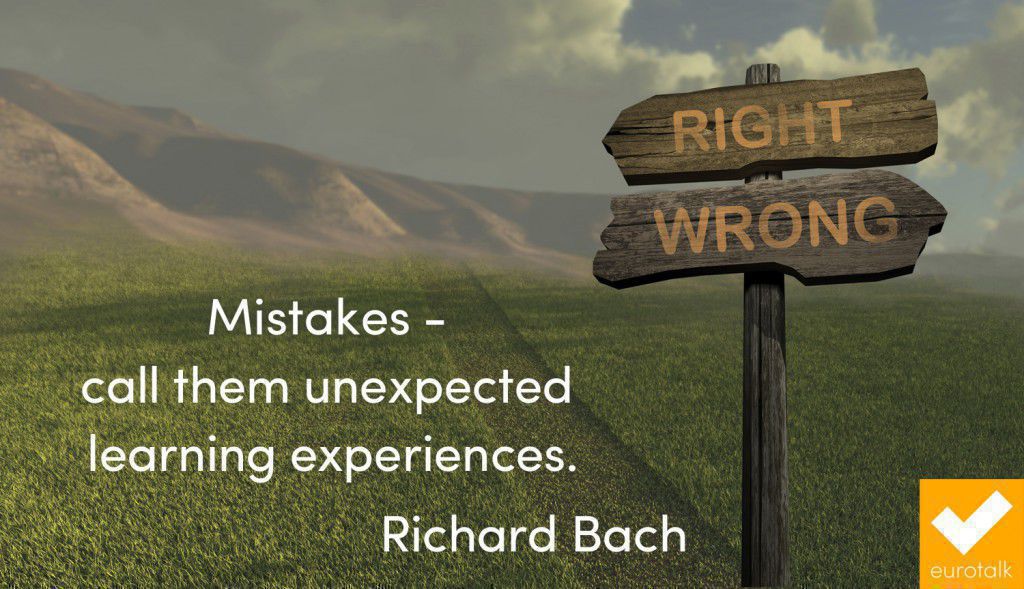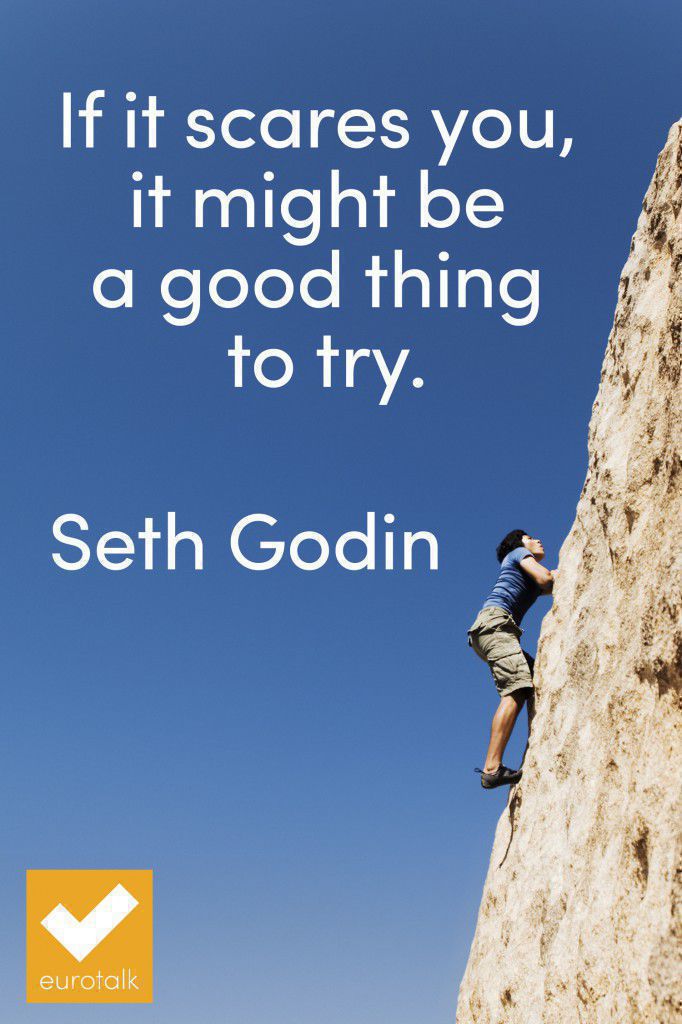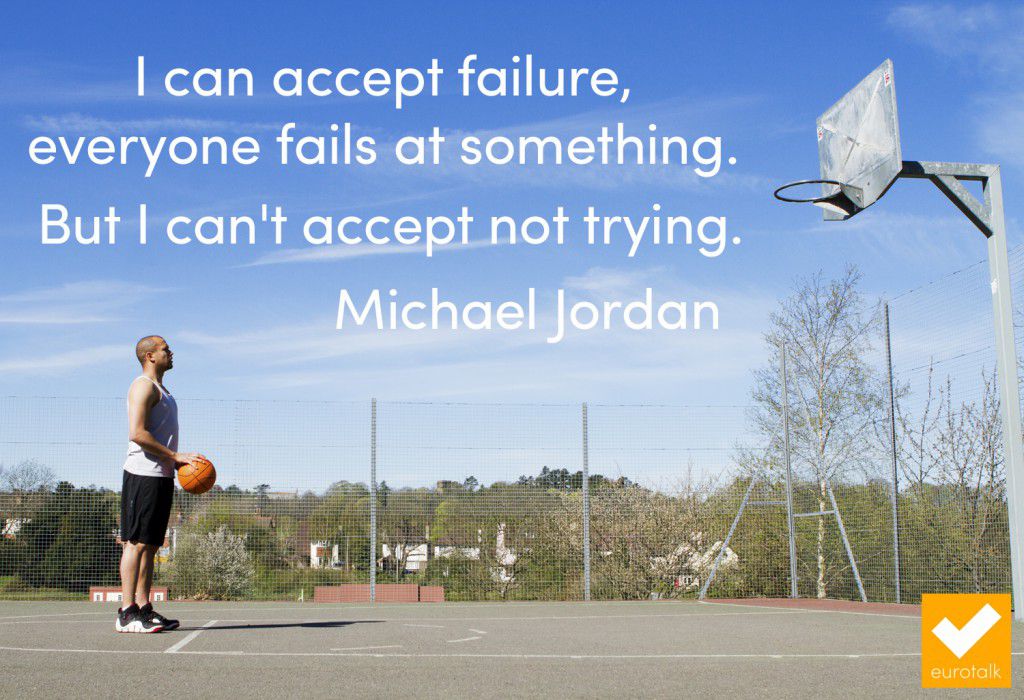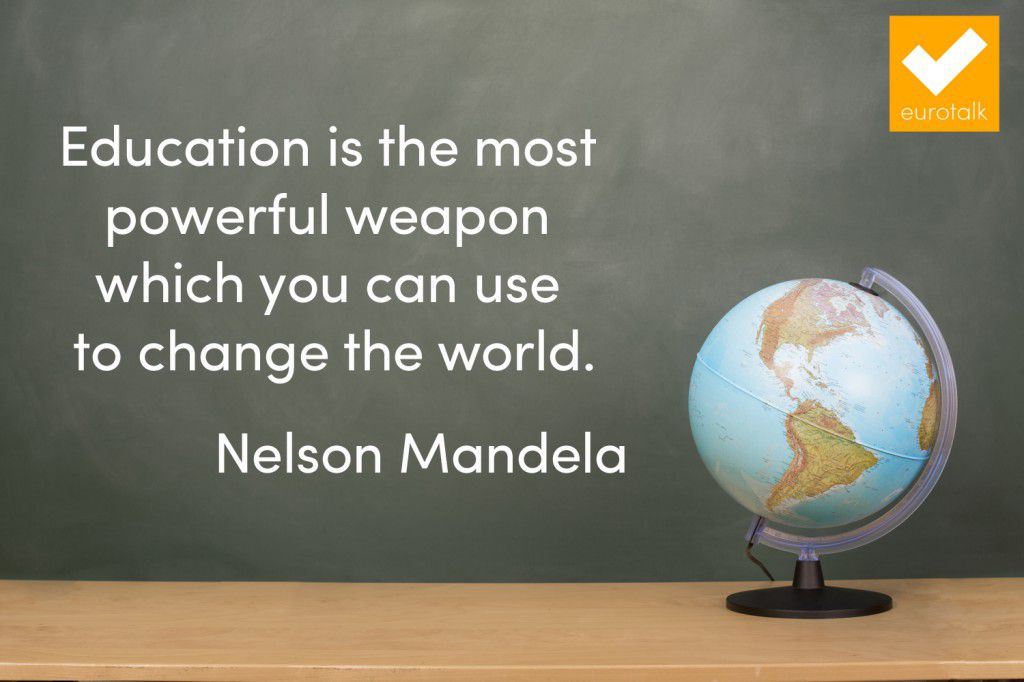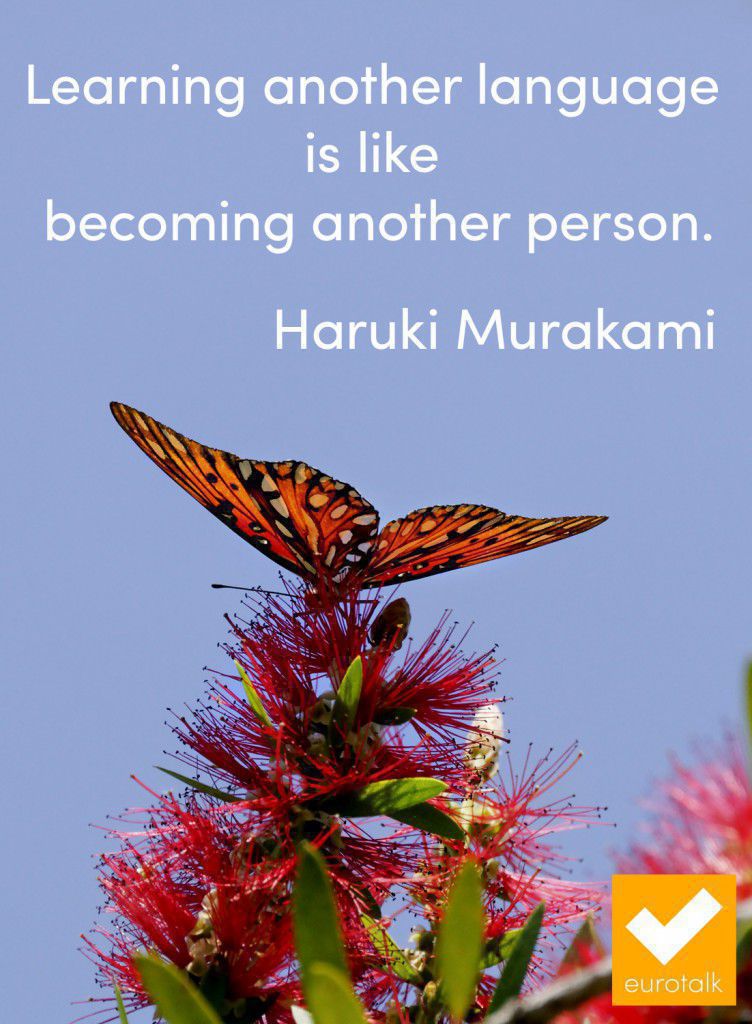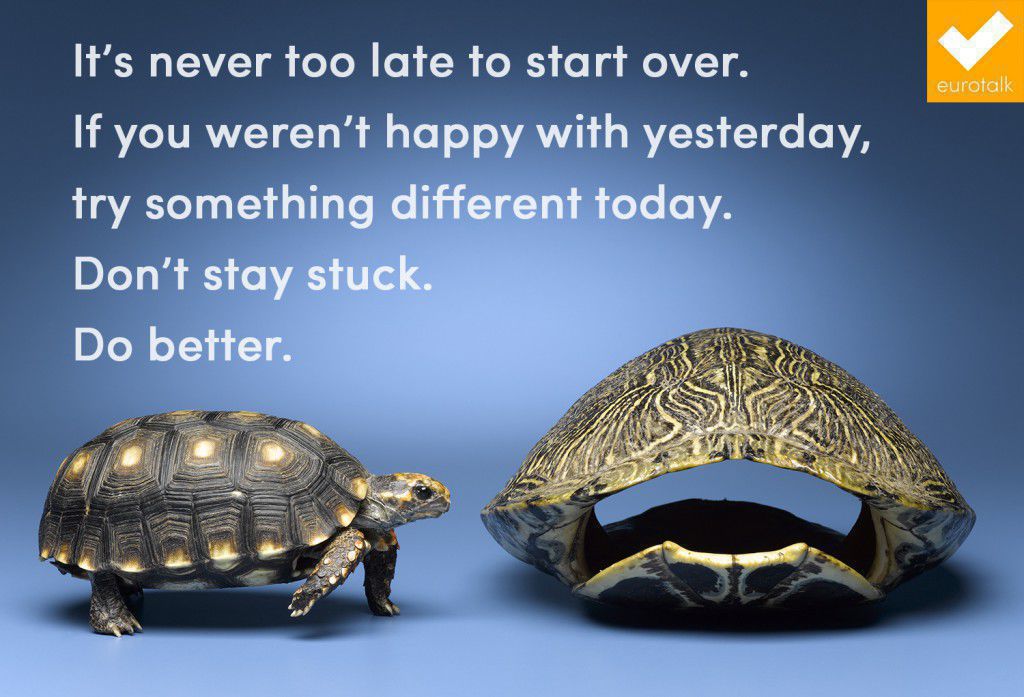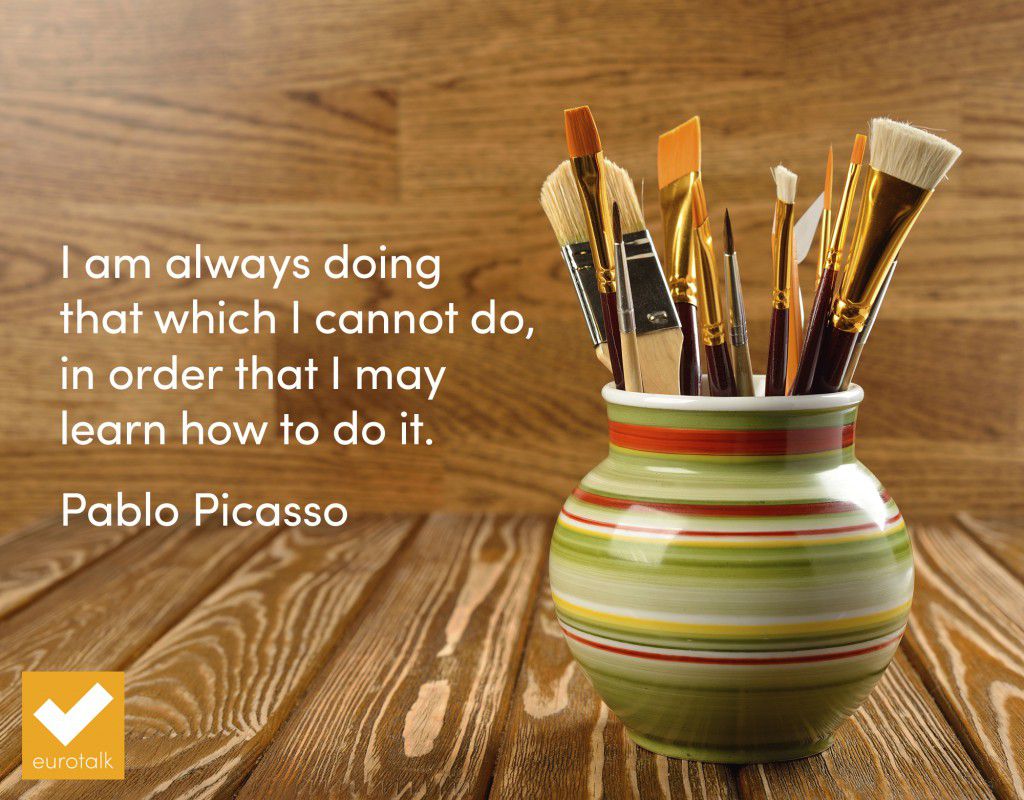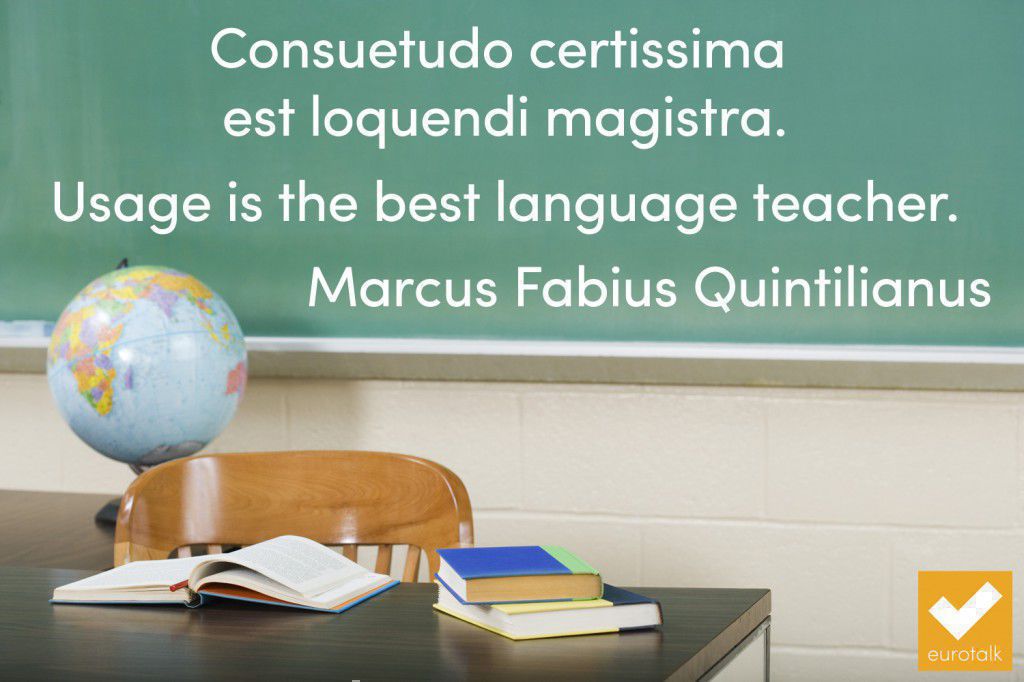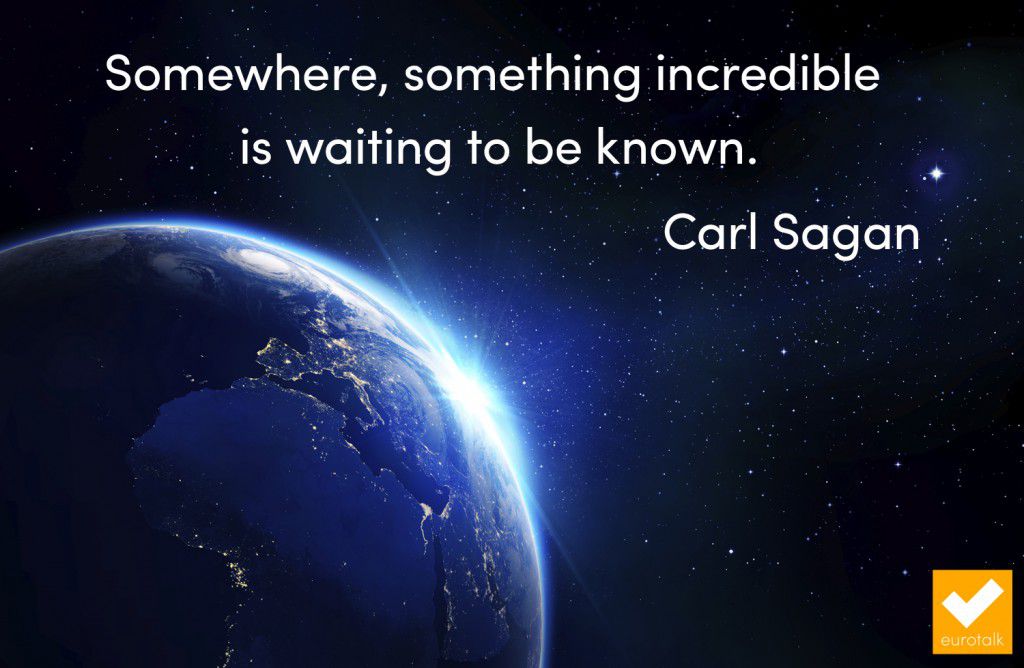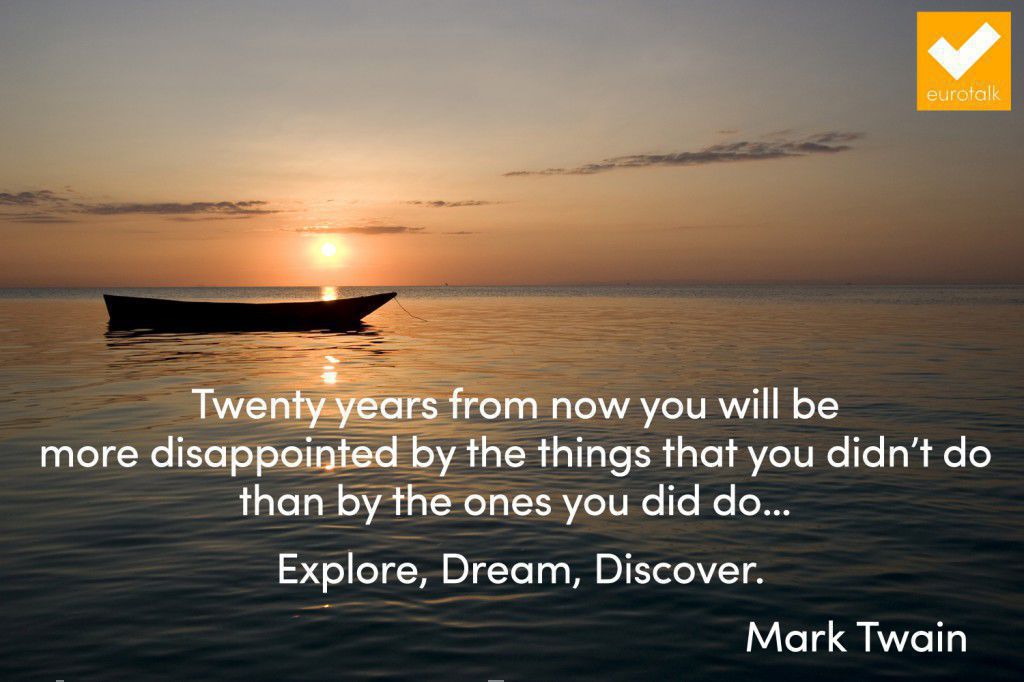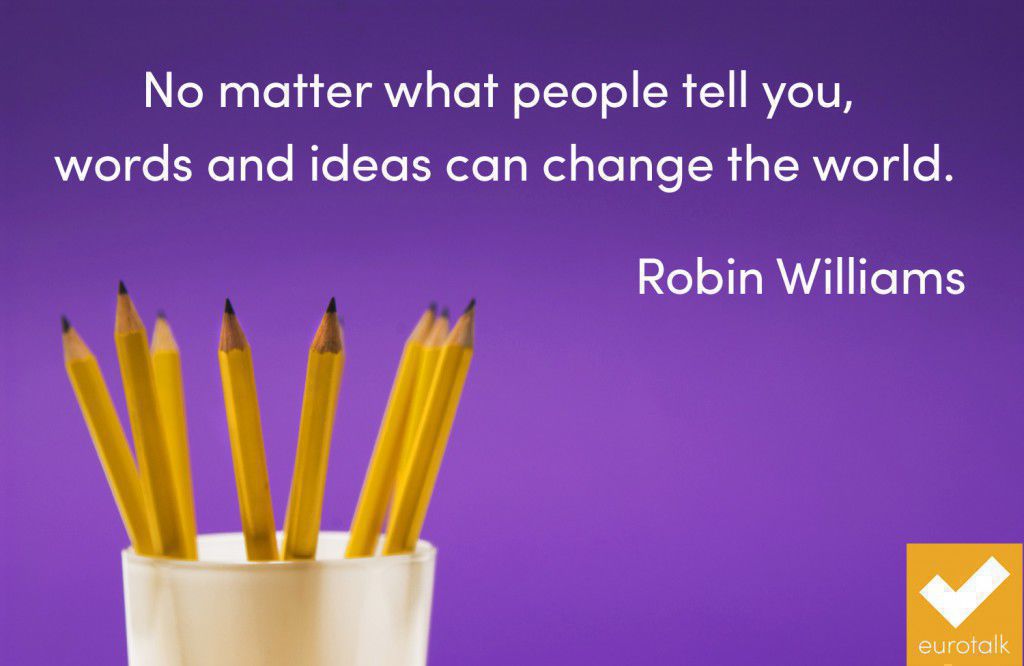More inspiring quotes for language learners
We love languages, and we love helping you to learn them. But we also know it’s not always easy – life has a way of throwing obstacles in your path, and then even when you’ve found time to learn, it can be scary the first time you go to use your new language skills.
So if you’re feeling in need of some motivation, here are a few more of our favourite quotes. If you’d like to share any of them, please do – and if you’ve got a quote you personally find helpful or inspiring, please let us know in the comments.
Happy learning!
Helping yourself to learn a language
Before launching into an ‘only teacher knows best’ tirade, which would sound incredibly biased as I am a language teacher myself, I would like to open with the statement that self-study is an essential part of learning a language. What happens in your classroom or with your private tutor is a good start, but anyone who tells you that this is all you have to do to learn a language is telling you a lie. Sorry about that.
 Classes are a great experience, yes, but like any new skill you want to learn, it is best to approach learning from many angles. There is no point having one lesson a week and then doing nothing at all, or, even more sinful, leaving that homework you promised yourself you would do until the night – or hour – before your next lesson. You are wasting your time and money, and yes. Us teachers can tell.
Classes are a great experience, yes, but like any new skill you want to learn, it is best to approach learning from many angles. There is no point having one lesson a week and then doing nothing at all, or, even more sinful, leaving that homework you promised yourself you would do until the night – or hour – before your next lesson. You are wasting your time and money, and yes. Us teachers can tell.
Having gone down the self-learning route myself, I’ve come across some resources I’d love to share with you.
Take for example things like Livemocha. A good all-round resource that is set up to partner you up with other language learners through language exchange, short online lessons, and lots of forums. It’s interactive, there’s always something new, and it’s free. What’s not to love?
If you don’t want to concentrate specifically on language learning and are looking for more of a language exchange/international vibe, Interpals could be the place for you. This site is a bit like a mix between Facebook and InterNations, so treat it with the same joy or disdain you do either of them. There are amazing connections to be made out there but then again there are also many to sever. Choose your friends wisely and never be afraid to use the block button with flair.
Not sure you’re ready for full-on instant message conversations just yet? Something like mylanguageexchange.com might be what you need. While both text and voice chat options are available, what I really like about this is the penpals who are happy to write either by email or even by traditional snail mail. Gifts in the post. Need I say more?
Another tool that is well worth trying is EuroTalk’s interactive series, Talk Now. This is a really easy way to pick up a good vocabulary base and I like the exposure to a lot of different accents. Yes, it is ‘staged’ because it’s a course, but if you’re concerned about who you’re speaking to out there or want to get confident first so that you can tell those with ulterior motives to ‘go away’ with perfect pronunciation, it really is a good investment.
As far as mobile apps go, I like Memrise for its simplicity. It’s sort of a drip-feed method of learning: you learn a series of words and there are ‘helpful’ memes sent in by users – I say ‘helpful’ because some really are helpful, some are hilarious so they just make you giggle, and some make you question the human race.
 Finally, there’s uTalk. This is a great time killer. All those moments sat waiting for the metro or in my case, waiting for students to finish their meetings when our lessons are due to start, can now be filled with quick and easy games to help you learn your desired language. Put down the Candy Crush, step away from the Jurassic Park Builder and pick up some new words!
Finally, there’s uTalk. This is a great time killer. All those moments sat waiting for the metro or in my case, waiting for students to finish their meetings when our lessons are due to start, can now be filled with quick and easy games to help you learn your desired language. Put down the Candy Crush, step away from the Jurassic Park Builder and pick up some new words!
Now, all these resources are tailored specifically towards learning a language. But there are other, more natural ways of learning.
Watching films in your target language but with English subtitles is an excellent way to learn, as is listening to real local radio – TuneIn is fantastic for this as it lets you search by locations the world over.
Find out about typical newspapers. In my case I used Helsingin Sanomat and found this from a quick Wiki search for ‘popular newspapers in Finland’. There will likely be an online version of your chosen paper and if you get stuck with translating you can either translate the entire page depending on your browser choice, or copy and paste the article directly into Google Translate.
Translate Eurovision entries, listen to commentary of your favourite sport in another tongue, embrace the possibility that there are songs out there in other languages that you will love – then translate and learn them by heart.
Changing the language of your social media and phone will also help, but that is for the brave and sure. Do this only if you’re confident you know enough of the language to avoid embarrassing mistakes.
Last of all, if you get the opportunity to speak, speak. If you overhear someone talking in the language you are learning, don’t be afraid to go over and say hello. Yes, perhaps you’ll startle them. But in my experience, it is just shock that a native English speaker has taken the time to bother to learn their language at all. Their first question to you will probably be ‘why are you learning…..?’
There are a million ways to learn. Try some 🙂
Kelly
8 ways to feel confident about speaking a language
So you’re off on holiday, and you’ve decided you’re going to speak a bit of the local language. You get a EuroTalk program (obviously), start learning a few key phrases, and you’re feeling good.
But then you get off the plane and the doubts start to creep in. What if people laugh at your accent? What if you say what you need to say perfectly, but don’t understand the reply? What if you open your mouth and instantly forget everything you’ve learnt?! Probably safer to stick to English, or sign language. Right?
 It is scary starting to speak another language. I get incredibly nervous – more so, ironically, with Spanish, which is a language I studied for years but haven’t spoken properly for a while. But sometimes you just have to throw yourself into it and see what happens. The worst that’s going to happen is that you don’t understand each other, but the reality is nobody’s going to laugh at you for trying to speak their language, or blame you if you make a mistake.
It is scary starting to speak another language. I get incredibly nervous – more so, ironically, with Spanish, which is a language I studied for years but haven’t spoken properly for a while. But sometimes you just have to throw yourself into it and see what happens. The worst that’s going to happen is that you don’t understand each other, but the reality is nobody’s going to laugh at you for trying to speak their language, or blame you if you make a mistake.
Now, obviously I realise ‘just throw yourself into it’ is a lot easier said than done. So here are some tips to help your confidence, before and during your conversation.
Go prepared
Bit of an obvious one, but you should try and learn at least a few words, so that you’re not going in to the conversation completely unprepared. At least that way you start off in control. It’s probably a good idea to learn how to say ‘I don’t understand’ and ‘please speak more slowly’ as well; at least that way if you do get stuck you’ll be able to do something other than stare blankly.
Find a language partner to chat to before you go
Learning on the computer or your phone is great for learning vocabulary and perfecting your accent, but at the end of the day, learning a language is obviously about conversation. If you’ve got a friend who speaks the language you’re learning, or is learning as well, set aside some time regularly to chat with them. It’ll be easier with someone you know and feel comfortable with than with a stranger, as you won’t be so worried about making mistakes.
Take uTalk with you
Because if your mind goes blank, you can grab your phone and search for the word you need in seconds. uTalk is much quicker (and better-looking) than a phrasebook, and it tells you how to say the word as well. Bonus.
Ban yourself from speaking your own language
I recently discovered Scott Young’s blog; he and a friend just spent a year travelling around four different countries, attempting to speak no English and immerse themselves completely in the local language and culture. This might seem quite drastic, but I can’t think of a better way to feel confident quickly – given a choice between speaking to people in another language or not speaking to anyone at all for three months, I know which one I’d choose.
Try thinking in the language
I’ve tried this approach before in Spanish and found it quite effective. When you look around your house, try and think what the objects are called in the language you’re learning, rather than English. (FlashSticks are useful for this sort of thing.) Try and think about a TV show you just watched, and explain it to yourself in the other language. Go outside and try to name as many everyday sights as you can. This way, it starts to feel like second nature and you may be surprised to find yourself doing it without trying.
Focus on how good you’ll feel afterwards
Have you ever had a conversation in another language? Remember how good you felt afterwards, when you were holding the train ticket you’d just bought, or eating the meal you’d just ordered? Any time you feel hesitant about starting a conversation, focus on that feeling and push on through. It’ll be worth it.
Make a phone call (a.k.a. jump in the deep end)
When I was at university, I spent my third year living in Madrid, and during my first few days I had to make lots of phone calls to try and find somewhere to live. And it was terrifying. I’m not really a fan of the phone at the best of times, but making calls in another language was twice as scary – without the aid of body language or facial expressions, it suddenly becomes a lot harder to understand what someone’s saying to you. But I did it, because I had to, and managed to successfully arrange several viewings; I’d never have thought I could do that before I left home.
And, if all else fails…
Have a drink
It’s a well-documented fact – mostly among students, for some reason – that having a drink or two actually improves your language skills. While that may not be entirely true, it does make sense that when you’re feeling relaxed, and your inhibitions are lowered, you’re going to feel more confident about giving it a go. Don’t have too many drinks though, obviously, or then nobody will understand you in any language.
Good luck!
Do you struggle with confidence when you’re speaking another language? How do you deal with it?
Liz
Are translation apps really the answer for travellers?
The first thing you need to do before embarking on a trip to a foreign land is to start learning the language. This will not only impress the locals, but will also make your visit easier and more enjoyable. In this hectic era, however, you may be forgiven for not dedicating the time necessary for learning a new language. In such instances, one might rely on a translation app to help fill in the gaps in your knowledge. But are these apps really an alternative to learning the language?
Of course you will continue to learn a lot while you are abroad. Simply engaging in conversation and navigating the signs and menus will put your skills to the test and improve them in the process. You can use any spare time to enhance your language learning with apps like uTalk. It’s a handy way to learn 111 languages while you’re on the move.
 If you are really stuck though, and haven’t managed to learn anything but a few basic phrases, then you may turn to a different kind of app. iOS, Android and Windows Phone all offer some great apps for translating speech in real time. It’s the sort of technology that was previously associated with science fiction, but now you can download it for free. The Google Translate app is one of the most popular real-time speech translation apps for Android and iOS, and it works in 50 languages. Skype also launched a real time translation option recently, and although it is probably the most advanced in terms of technology, it’s only available in two languages at present. Technology like this will inevitably change the way we think about global travel.
If you are really stuck though, and haven’t managed to learn anything but a few basic phrases, then you may turn to a different kind of app. iOS, Android and Windows Phone all offer some great apps for translating speech in real time. It’s the sort of technology that was previously associated with science fiction, but now you can download it for free. The Google Translate app is one of the most popular real-time speech translation apps for Android and iOS, and it works in 50 languages. Skype also launched a real time translation option recently, and although it is probably the most advanced in terms of technology, it’s only available in two languages at present. Technology like this will inevitably change the way we think about global travel.
I have tested many of these apps and have found that they can be a godsend when you are searching for that one elusive word to help you get your point across. You can also try to convince a bewildered local to speak into the phone in the hopes that the voice recognition software and the translation software work well enough to produce a coherent sentence. Unfortunately such apps are still a long way from perfect, as factors such as regional dialects and background noise can seriously impact the quality of the translations.
There are also practical problems posed by using a translation app in a restaurant or train station. You shouldn’t be surprised to hear irritated grunts of derision from locals, especially if there is a queue behind you. That’s why far from being a substitute for language learning, these apps are at best a means to supplement a traveller’s existing language skills.
At first such groundbreaking technology seems as though it holds the revolutionary potential to knock down language barriers and make language learning redundant. But although the level of technology available now is far beyond what it was a decade ago, there’s still plenty of room for improvement. It takes a human mind to understand the nuances of language and intended meaning. These apps might be great for ordering food on holiday, but you can’t use them to have meaningful conversations or to translate literature. The day such apps finally make language learning redundant will be the same day that translation technology replaces professional translation services.
Author biog: Tom Rowsell is a writer and language enthusiast from East London. His fascination with language began while studying Old English literature at University.

